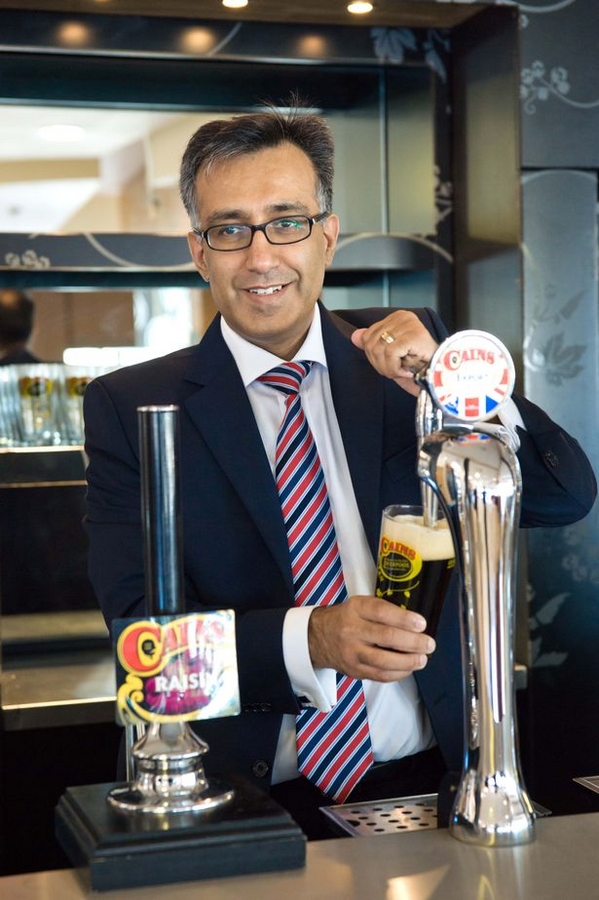Cain's brewery closes and sacked workers call for Merseyside boycott of beer & pubs
Added: Wednesday, May 22nd 2013

Sacked workers at Cains Brewery in Liverpool have called for a boycott of the company’s beer and pubs following the closure of the brewery during the week of 13 May. The plant has been mothballed while the owners, Ajmail and Sudarghara Dusanj and their families, go ahead with plans to turn the redbrick Victorian site into a Brewery Village (artist's impression above).
This week 38 sacked employees – half the workforce – held a demonstration outside Cain’s flagship Doctor Duncan pub near Lime Street Station. They were supported by their union, Unite, which backed the sacked workers’ demand for a boycott of Cains.
The workers claim they have not been paid all the money owed them since the Dusanj brothers closed the brewery. Some had worked for Cains for 20 years. The workers were told by phone not to report for duty. They have not been paid redundancy or holiday money or all their back pay.
Managing director Sudarghara Dusanj told the dismissed workers to apply to the government’s Redundancy Payment Scheme but the scheme usually only pays workers when a company has failed.
The brothers are in talks with another brewery to see if some of their beers can be produced under licence.
A spokesman for Cains said the brothers “deeply regretted the loss of jobs but were forced to close due a decline in supermarket orders”. While Cains produces its own cask beers and lagers, a substantial part of the business in the 200,000 barrel brewery in Stanhope Street has been taken up by own-label supermarket beers.
It’s understood the brewery lost two supermarket contracts last October and in January this year, halving production at the site.
Unite’s regional officer Frannie Joyce said the workforce had been treated in “a disgraceful and draconian manner. Unite is 100% behind our members and we’re calling on the people of Merseyside to support the workers in their fight to secure all the money that is owed to them and to boycott all Cain’s beers until this happens.”
Mr Joyce added: “The management are not fit and proper people to run a modern business.”
One former worker on the demonstration said he knew “something was up” when all production stopped the week prior to the closure.
In July, Cains will submit plans to the local authority to turn the Grade-II listed site in to a Brewery Village, costing £50 million. The site will include a hotel, cinema, flats, food market and spa. The company says the village would create 80 new jobs.
Cain’s spokesman said: “The decline in supermarket own-label beers had had a huge impact on our business. The nature of our brewery is such that its operations cannot be scaled down in a simple fashion.
“But brewing remains at the heart of our plans for redevelopment of the site. The existing brewery will be redesigned during the anticipated scheme so it’s more efficient and better suited to future use.
“We are discussing with our advisors about how we best manage winding up the current canning and brewery side of the business.”
But the Merseyside branch of CAMRA, the Campaign for Real Ale, said that by closing the brewery Cains had no cash flow except for its three pubs.
“Failure to pay redundancy raises questions about the financial state of the company,” the branch added.
The brewery dates from 1858 when it was opened by an Irish immigrant, Robert Cain. In the 20th century it became known as Higson’s Brewery, which was taken over by Boddingtons of Manchester in 1985. The Liverpool brewery closed when Boddingtons was bought by national brewer Whitbread.
It was reopened by a Danish brewing group, which ran into acute financial difficulties. It was rescued by the Dusanj brothers in 2002. They had previously run fish and chip shops and then a soft drinks company.
In 2007, in a complex reverse takeover, Cains acquired the Honeycombe Leisure group for £2.1 million, which dramatically increased the number of pubs to 109. But in 2008 the company was placed in administration due to unpaid taxes and millions of pounds of additional debt.
But as the Dusanj family had retained separate ownership of the freehold of the brewery site and their original pub estate they were able to continue brewing and retailing.
*Pictured below managing director Sudarghara Dusanj









